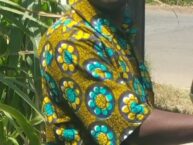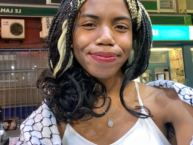 Adeola Opeyemi Salau works as an editor at WriteHouse Collective. She has been published in both online and print Journals. She writes from Lagos, Nigeria.”Being a Man” is on the 2015 Writivism shortlist.
Adeola Opeyemi Salau works as an editor at WriteHouse Collective. She has been published in both online and print Journals. She writes from Lagos, Nigeria.”Being a Man” is on the 2015 Writivism shortlist.
Being a Man
I had always wanted someone to die in my family. For a long time I envied friends whose parents had died. Mourning was a loud affair, a congregation of relatives and friends. The kitchen was always filled with female sympathizers cooking up a storm while the sitting room was filled with male elders chatting about the deceased. Every dead man is a good man at his funeral. I imagined how people would visit us and cry with us and tell us everything would be all right. How great it would be to have people pity me, pamper me, the boy who had lost someone.
Then Isa died.
Isa’s death was different from any I’d witnessed. It was accom- panied by too much silence. There was no cooking, no display of a body wrapped tightly in a shroud and tied with ropes as if to prevent it from escaping. No last prayer in the mosque where male family members were allowed to stay in the front row and lay unspoken claim to the corpse.
Isa’s death was a boring affair.
Baba sat in a corner of the sitting room, his eyes fixed on a distant wall as if trying to conjure something out of it. I stared at him and realised it was the first time I’d seen him without his cap, and I was fascinat- ed by his grey hair.
‘Inna lillahi wainna ilaihi rajiuun,’ my uncle exclaimed for the tenth or more time.
‘From Allah we came and to Him we shall all return,’ Moham- madu, Baba’s friend, replied.
The two men had been saying the same thing all morning; it was as if they had rehearsed their utterances together before the news of Isa’s death came.
Mohammadu’s hand rested on Baba’s shoulder, consoling him, but Baba wasn’t crying, nor was he saying anything. He just sighed occasion- ally like someone trying to swallow a big morsel.
Baba never cried, not even when Salamatu, my younger sister had succumbed to cholera and the Health Centre had refused to admit her for lack of facility. They said Baba had ridden his bicycle across ten villages to get to a state hospital. Of course, Salamatu had been too dehydrated to survive the journey. It was said Baba didn’t shed a single tear as he rode back to the village with Salamatu’s cold body strapped to his back.
Now, they said Isa was dead.
Isa was Baba’s first son from his first wife, Ummah. My mother was the second wife. Isa was the first to go to secondary school, at the age when boys joined Nagudu’s truck to the big city. Everyone said Baba was crazy for sending Isa to school and not the city, where real money was.
‘They wouldn’t give us his body,’ Baba lamented to no one in particular.
It was the first thing I heard him say all day.
‘Walahi, there was a boy among the burnt corpses that looked like Isa,’ Baba gnawed at his blackened fingernails, ‘but they didn’t let us bring him home. They won’t let us bury him properly. Why won’t they give me my son?’
‘Maigida, all burnt bodies look alike. We cannot be sure the body was Isa,’ Mohammadu replied.
Everyone looked at him expecting more, but Baba just shook his head and continued staring at the wall.
I didn’t understand how somebody could be dead without a body and a proper burial. I imagined Isa bursting into the compound, smiles on his face, his little radio blasting Fatima Nijar’s songs and telling us it was all a mistake. I imagined he would knock my head and stroll into his room, making sure I never got a chance to peep in.
His room was across the compound. Father had given him the room so he could have the privacy to study. I would linger at his door, hoping to catch glimpses of his Rahama Sadau wallpaper.
Beautiful Rahama, Isa and I dreamt of marrying her. Mama told me that I was more handsome than Isa and if I went to the city and made big money, I would have many girls running after me.
I closed my eyes to the silence and waited patiently for Isa’s footsteps and the sonorous voice of Fatima Nijar, but I heard nothing. I shut my eyes even tighter, wishing to conjure Isa’s face but drawing a blank.
The soft wailings from the women’s quarters were clearer with my eyes closed. Ummah’s was the loudest. I stood, shuffling my feet but no one took notice. Baba was still staring at the wall and he seemed to be seeing something nobody else could. I moved towards the exit, towards the wailing.
‘Where are you going?’ Baba’s voice rang out sharply.
‘To check … to see … ’ I gestured to the women’s quarters. ‘Zauna!’ my Uncle ordered and pointed to the mat beside him.
‘Sit down and stop acting like a girl.’
I stood rooted to the spot, ashamed and angry. I hated being called a girl. I gave my uncle an angry look and stared at my feet. Nothing was going as expected. This mourning was supposed to be about people caring for me. Tears threatened to spill.
‘He acts like one, walahi.’ Baba gave me his side-eye look that I associate with disappointment. ‘Not having many children has made his mother spoil him.’
Mohammadu grabbed my shoulder and dragged me back. ‘You need to start acting like a man. Can’t you see your brother is dead?’
I whimpered and the tears ran down my harmattan-beaten face. I didn’t understand this silent death. I wanted my mother. I wanted to sit in her room and let her hold me.
‘Shh! Don’t you know?’ Mohammadu said. ‘Men don’t cry.’
I wiped my tears and returned to my corner of the mat. I wanted to be a man, to be allowed to sit with the men. Men don’t cry. Men are quiet. Maybe if I were quiet, I would be considered a man and if Isa ever returned, he would allow me into his room and let me touch his Rahama Sadau wallpaper.
Quiet … quiet … quiet … my mind formed a tune with the silence in the room and soon I dozed off.
***
Three months after Isa’s death, our home remained shrouded with sorrow and deafening silence. We heard of Boko Haram attacking villages near us. Last week it was Gamboru, Gumsa too. I heard Baba and his friends talk about how people were shot and beaten and their villages burnt down.
People stopped their children from going into the bush to look for fruit; they said if Boko Haram didn’t kill them, the soldiers would shoot the boys for appearing suspicious. Everybody looked like Boko Haram to the soldiers.
I wasn’t afraid of the army or the Boko Haram. I had practiced the fight scenes we saw on Mohammadu’s television with the other boys and we were ready for any invasion. I tried to tell Ummah and Mama not to worry, that my friends and I were prepared. I even showed Mama how I would fight them. She took one look at me and started weeping.
Mama cried regularly since Isa died. Sometimes, I found her sobbing in the kitchen, her cooking left unattended. Ummah stopped crying a few days after Isa’s death. She stopped talking to people too. On the second day after Isa’s death someone had told her that the unharmed boys from Isa’s school had been sent home. Ummah had rushed out at the sound of every car or motorcycle passing by. She had then returned to her room crying each time she realized the newcomer was not Isa. By the third day, Ummah only left her room to use the compound’s toilet.
I was sitting outside the family sitting room, staring at Isa’s room and wondering if I should go in and touch his stuff, when I heard several gunshots in the distance. Mama ran in and out of her room several times before she grabbed me, my younger sister strapped to her back. She banged on Ummah’s door but did not wait for an answer. We ran because everyone else was running but we didn’t know where. I looked behind me and saw Baba emerge from his room with a knife; a man in camouflage was walking towards him with a big gun.
I stopped to stare at Baba and his attacker.
‘Let’s go,’ Mama said and we ran into the forest, machine gunfire and screams behind us.
I wished mother would let us stay and fight.
***
Our group hid quietly behind a mountain of red earth, hands over our mouths as if our hearts were about to jump out. We heard footsteps, people running to safety, attackers running after them, gunshots creating a halting note in the agonizing cries of the villagers.
‘Allah Akbar!’ we heard the attackers shout at intervals.
‘Ayah Akka!’ my two-year-old sister repeated, her flaying hands mimicking prayer posture.
‘Shut up!’ one of the men whispered, but the daggers in his eyes were directed at Mama.
Something in the man’s eyes and voice scared her and she started wailing. I reached across and rubbed her head.
‘Stop crying,’ I said, but she wouldn’t. Her voice got louder and others started murmuring.
‘Make her stop now,’ another man said, glaring at Mama.
Mama shrank away from the men and unstrapped my sister. She put a dry breast in her mouth. She sucked but no milk appeared. She removed her mouth from the breast and cried louder. Mama instantly cov- ered her mouth with her palm but it was too late.
Two men moved towards us. One of them was Baba’s tailor; the other had visited when Isa died.
‘We have to kill her,’ the tailor said and moved to snatch my sister. Mama scrambled back from him.
I stood before them, three feet tall with a tiny voice, ‘Don’t touch my sister.’
‘Move aside, let them do it,’ a woman said. I knew her well; she was Mama’s friend.
‘Ramatu!’ Mama exclaimed.
‘I will not die because your brat can’t be quiet,’ Ramatu said and looked away.
‘They are coming this way,’ a man peeping around the mound whispered. ‘We need to be quiet or we’ll all die.’
I looked at the man; he had kind eyes. I’d never seen him before.
My sister kept crying, muffled by Mama’s palm on her mouth.
‘This child will expose us. We have to kill her!’ said the man who had first ordered my sister to be quiet. ‘Give me the child now.’ He reached for my sister.
Mama moved farther away, her grip on my sister tighter. The Tailor held Mama’s arms as another man grabbed my sister. I clutched onto Mama’s waist and watched as they passed my sister to another man, the one with the kind eyes.
The man with the kind eyes took her, placed his big palm over her mouth, and with a single fluid movement used his other hand to wring her head like a wet cloth. My sister stopped crying. Her mouth hung opened in a permanent silent scream. He cradled her for a few seconds and then dropped her at Mama’s feet.
Mama screamed, threw herself, landing heavily beside my sis- ter’s body, ‘Wayyo Allah na!’
A man covered her mouth and asked if she wanted to die too. Mama shook her head vigorously and stopped struggling with the man. The man released Mama and there was silence amidst us.
No screams, no crazy laughter, no cries mingling with gunshots.
I stood staring at my sister’s body, wondering if she would resume crying anytime soon. Everyone was staring at the skies, the mound of red earth. No one looked at my sister or met Mama’s eyes.
I waited quietly for Mama to cry, to tie her wrapper around her waist and fight like she used to do with Ummah, but Mama just sat quietly, her eyes fixed on my sister.
We waited in fear.
‘Run,’ Mama whispered into my ear while she cradled my sister’s body. ‘Run now!’ she said and pushed me forward.
I stood staring at her; she was no longer crying.
‘Run,’ she said again and pushed me towards the other side of the earth mound facing the woods. I didn’t know where to go, I didn’t want to go. I started crying then. Why was Mama sending me away?
‘Run,’ she repeated and her face hardened. ‘I’ll be right behind you.’
I ran so fast I could feel my heart thumping, and my throat burning, expecting to hear Mama’s footsteps behind me.
***
My legs burned and my lungs screamed, but I ran until I hit something strong and unyielding. I fell backward and lay there looking up at a giant.
He was the tallest man I’d ever seen; behind him were men not as tall as him, dressed in camouflage and boots. Bullets flew past my head and straight towards where I had come from.
I didn’t move. I watched birds flying out of the trees. I heard screams. I heard laughter. I heard silence. I saw smoke curling out of the men’s guns and when I turned my head to look at Mama and the rest, I saw how they’d fallen on each other, smoke rising from their bodies. My eyes followed the river of blood as it flowed away from the mound of bodies.
I rose to my knees and stared at Mama, then jumped to my feet and started to run towards her. The giant grabbed my collar and spun me around. His eyes were the red, his big lips twisted in distaste. He looked like a monster from a folktale. I felt a tug in my stomach and my knees weakened. I stared down at his feet and started sobbing. He stuck his gun under my chin and raised my head.
‘Shekarankanawa?’ the giant asked.
I swallowed my sobs. ‘Ten but I will soon be eleven.’ The pride when mentioning my age was gone from my voice.
‘Small child,’ he snickered.
‘Stop crying like a girl!’ another man snapped at me.
‘I’m not a girl!’ I snapped back and rushed at him, kicking without giving a thought to his size or weapon.
They all laughed but I kept on attacking, using all the moves we’d practiced. The man laughed harder. I kicked until my legs hurt, until I was tired and started sobbing.
The men stopped laughing and one of them walked over and kicked me. I fell flat on my behind and wailed louder.
‘Shut up and get up,’ the giant said.
There was something in his eyes that made me stop and I got up slowly and looked at them. This man looked worse than Hajji, the village bully and disciplinarian. Children were sent to Hajji to be disciplined. This giant with his bloody stares and black lips, I imagined even Hajji would be afraid of him.
I noticed a boy whimpering in their midst.
He was very tall, like Isa, and he wasn’t wearing camouflage. He must have been around Isa’s age too. But he was not from my village. I had never seen him before.
‘You know him?’ the Giant asked.
I shook my head, my voice raw from crying, my throat burning from gun smoke.
‘Kasheshi,’ the giant said, his mid finger pointed at the whimpering boy.
The others laughed. I looked up and studied their faces for the first time. They were all young, maybe just a bit older than the whimpering boy. I wished my friends were here, we would have teamed up and beaten them silly.
‘Kasheshi!’ the giant shouted and poked his gun in my ribs.
Kill who? I should kill him or he should kill me? I didn’t ask. I was too afraid to open my mouth. Hot liquid trickled down my legs. I clamped my legs together to stop the flow. ‘Kill him!’ the giant repeated, louder and firmer. They were no longer laughing.
I started wailing again, calling Mama to come to my rescue. Someone slapped me and I stopped. The giant forced a knife into my hand while the others made the boy kneel. His hands were tied behind his back.
The boy and I were crying.
‘Bismillahi,’ the giant said. The others murmured the same thing. ‘Slaughter him.’ The giant barked into my face and his bad breath washed over me.
I moved closer to the boy, my trembling hands in sync with the thumping of my heart. One of the men held the boy’s head and I dipped the knife into his neck. Blood gushed out and the boy screamed but my screams were louder, my fear burying his pain. I dropped the knife and stumbled away, vomiting.
The giant picked up the knife and sliced off the boy’s head. The head fell, rolling towards me, dripping blood into the red earth, rolling until it stopped a foot away from me, wide eyes staring at me.
The boy’s screams still echoed in the distance; it was as if he was far away, screaming as he ran. I looked away and threw up again. The giant wiped the knife on my shirt and started a chant in Arabic. The others joined him. I looked at the blood on my clothes and vomited again.
‘Alhamdulilahi for today’s cleansing. It’s time to go,’ said another. They stopped chanting and the giant patted my back and barked.
‘Get up! You are now a man.’
I looked at him, his words sinking slowly.
The Giant held me by the collar and propelled me forward. My heart started a strange dance and I looked back, seeking out my mother in the pile of bodies a few feet away. I wanted to run to her. I wanted to shake her awake and tell her I just killed a boy. Tell her I was a man. I wanted to see the pride in her eyes.
I wished Baba were someplace where I could find him and boast that I was now a man, but we had left the village behind. I watched the sun slowly disappearing behind the clouds. A yellow ball with red spots, as if stained by the blood.
The giant dragged me deeper into the forest, his men following close behind. When I was a boy, Ummah used to say the forest was home to dangerous animals and evil spirits.
I am a man!
Night was settling in the forest and the birds were flying back to their perches and singing. The boy’s screams no longer echoed and I won- dered if birds had been singing when Isa died.




12 comments for “Being a Man by Adeola Opeyemi”